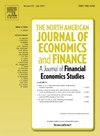The dynamics of corporate climate risk and market volatility: International evidence
IF 3.8
3区 经济学
Q1 BUSINESS, FINANCE
North American Journal of Economics and Finance
Pub Date : 2025-04-15
DOI:10.1016/j.najef.2025.102435
引用次数: 0
Abstract
This study investigates the impact of firm climate risk exposure on market volatility, with a particular focus on the moderating roles of firm-specific and country-level characteristics. Using a comprehensive global panel of 38,808 firm-year observations across 54 countries from 2002 to 2023, we employ fixed-effects regressions, two-step GMM, and an instrumental variable approach to address endogeneity and unobserved heterogeneity. The analysis reveals that higher climate risk exposure is associated with significantly greater market volatility, reflecting investors’ heightened sensitivity to climate-related risks. Importantly, firm-level factors such as strong corporate governance, high R&D intensity, and strategic positioning are found to mitigate these effects. At the country level, weaker environmental policy frameworks and underdeveloped financial systems amplify climate-induced volatility, underscoring the role of institutional quality. We also examine the influence of major climate policy events such as the Paris Agreement and find evidence of a post-policy decline in volatility, suggesting increased investor confidence in global climate governance. Overall, this study contributes to the climate finance literature by offering novel insights into how both corporate strategies and institutional environments shape the financial consequences of climate risk, providing practical implications for firms, investors, and policymakers.
企业气候风险和市场波动的动态:国际证据
本研究调查了企业气候风险暴露对市场波动性的影响,尤其关注企业特定特征和国家层面特征的调节作用。我们采用固定效应回归、两步 GMM 和工具变量法来解决内生性和非观测异质性问题。分析表明,气候风险暴露程度越高,市场波动性就越大,这反映出投资者对气候相关风险的敏感度越高。重要的是,强有力的公司治理、高研发强度和战略定位等公司层面的因素被发现可以减轻这些影响。在国家层面,较弱的环境政策框架和欠发达的金融体系扩大了气候引起的波动,突出了制度质量的作用。我们还研究了《巴黎协定》等重大气候政策事件的影响,发现了政策出台后波动性下降的证据,表明投资者对全球气候治理的信心增强。总之,本研究为气候融资文献做出了贡献,提供了关于企业战略和制度环境如何塑造气候风险财务后果的新见解,为企业、投资者和政策制定者提供了实际意义。
本文章由计算机程序翻译,如有差异,请以英文原文为准。
求助全文
约1分钟内获得全文
求助全文
来源期刊
CiteScore
7.30
自引率
8.30%
发文量
168
期刊介绍:
The focus of the North-American Journal of Economics and Finance is on the economics of integration of goods, services, financial markets, at both regional and global levels with the role of economic policy in that process playing an important role. Both theoretical and empirical papers are welcome. Empirical and policy-related papers that rely on data and the experiences of countries outside North America are also welcome. Papers should offer concrete lessons about the ongoing process of globalization, or policy implications about how governments, domestic or international institutions, can improve the coordination of their activities. Empirical analysis should be capable of replication. Authors of accepted papers will be encouraged to supply data and computer programs.

 求助内容:
求助内容: 应助结果提醒方式:
应助结果提醒方式:


